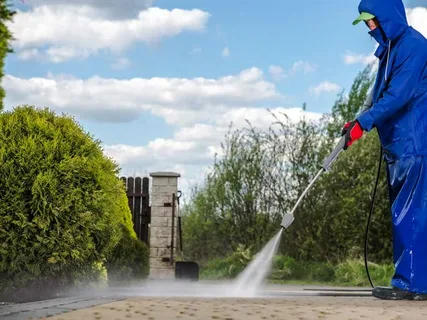When it comes to tackling tough cleaning jobs in commercial settings—whether it’s removing grease from industrial floors, washing heavy-duty vehicles, or restoring building exteriors—having the right commercial pressure washing equipment makes all the difference. But with so many options available on the market, how do you choose the best equipment for your needs?
In this guide, we’ll explore the most important factors to consider when selecting commercial pressure washing equipment to ensure you’re investing in the right tools for maximum efficiency, performance, and value.
1. Power Source: Electric vs. Gas
The first decision you’ll need to make is whether you want electric or gas-powered equipment:
- Electric Pressure Washers
- Quieter operation
- Ideal for indoor or noise-sensitive environments
- Require constant access to electricity
- Typically lower PSI and GPM
- Gas-Powered Pressure Washers
- More powerful and portable
- Better suited for outdoor or large-scale jobs
- No power cords but require fuel
- Louder and emit exhaust fumes
Choose based on your work environment and required mobility.
2. PSI and GPM Ratings
Two key specifications for any commercial pressure washing equipment are:
- PSI (Pounds per Square Inch) – Indicates pressure level. Higher PSI = more force.
- GPM (Gallons per Minute) – Measures water flow. Higher GPM = faster cleaning.
Example:
- Light-duty cleaning: 1,000–2,000 PSI and 1.5–2 GPM
- Heavy-duty commercial use: 3,000+ PSI and 3+ GPM
Balancing both ratings is crucial for optimizing cleaning performance and efficiency.
3. Hot Water vs. Cold Water Pressure Washers
- Cold Water Units
- Suitable for removing dirt, mud, and light stains
- Lower cost and maintenance
- Ideal for general commercial cleaning
- Hot Water Units
- Better at cutting through oil, grease, and grime
- More expensive but highly effective in industrial settings
- Essential for food service, automotive, or oil-heavy environments
If your work involves oily or greasy surfaces, hot water is a must.
4. Portability and Size
Consider where and how often the equipment will be used:
- Stationary Units – Ideal for facilities with a designated cleaning area
- Portable Units – Mounted on carts or trailers for mobility across job sites
Think about storage space, transportation, and ease of movement before selecting a size and configuration.
5. Build Quality and Durability
Look for units built with high-grade components, such as:
- Stainless steel or brass pump heads
- Heavy-duty hoses and frames
- Reliable engine brands (e.g., Honda, Kohler)
Durable construction ensures your commercial pressure washing equipment stands up to heavy use and harsh environments.
6. Attachments and Accessories
Versatility matters. Choose a model compatible with:
- Interchangeable nozzles and wands
- Surface cleaners and rotary heads
- Hose reels and extension wands
These accessories can enhance productivity and make specialized jobs easier.
7. Maintenance and Support
Commercial-grade equipment requires upkeep. Make sure the manufacturer or distributor offers:
- Easy access to spare parts
- Comprehensive manuals and troubleshooting guides
- Customer service and warranty support
- Local service centers (if needed)
Reliable post-purchase support adds long-term value to your investment.
8. Budget and ROI
While it’s tempting to go for the cheapest option, consider the total cost of ownership:
- Upfront price
- Fuel/electricity costs
- Maintenance and repairs
- Downtime due to low performance or failure
Investing in a durable, high-performance machine often pays off in reduced labor and faster cleaning times.
Final Thoughts
Selecting the right commercial pressure washing equipment is about more than just buying the most powerful model. It’s about understanding your specific cleaning needs, working conditions, and long-term goals. By carefully evaluating the factors above, you can choose a machine that delivers consistent results, improves job efficiency, and provides the best return on investment.
Whether you’re cleaning construction sites, restaurant patios, or vehicle fleets, the right equipment is your strongest ally in maintaining cleanliness and professionalism.
















